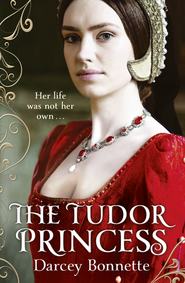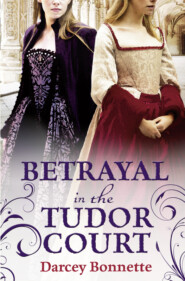По всем вопросам обращайтесь на: info@litportal.ru
(©) 2003-2025.
✖
Rivals in the Tudor Court
Настройки чтения
Размер шрифта
Высота строк
Поля
“Mummy sees nothing,” I say with a little more harshness than intended.
“What about the people in the Bible?” Thomas asks. “They saw angels all the time.”
I had never really read the Bible. I want to say I always intended to, but it isn’t true. I can’t bring myself to pick it up. I shrug. “Times were different then” is the best thing I can think of to say. “Do not worry, Thomas. We will get through this. You will feel better. We have no other choice.” I recall my grandfather’s words, words that seemed so cold but were the best he could come up with. “We are Howards.”
Perhaps it is better clinging to this abstract idea of a name and the greatness that can be associated with it than to the realness of people, people who are bound to leave in one way or another.
I rise, leaving his bedside. In the hall I encounter the princess, who has brought a basket of sweet-smelling herbs to the room along with some embroidery.
I seize her upper arm. Her eyes widen in surprise.
“What are you thinking, passing your fancies on to our son?” I seethe. “Aren’t we in trouble enough as it is without his having to believe in such drivel? There is nothing that can come of it. Shroud him with illusions and the world will be all the more cruel to him when reality sets in.”
“Reality has set in,” returns the princess. “And I can think of no better way to ease his pain and sorrow than with these ‘fancies’ of mine. What else have we to cling to but our faith in the unknown, our faith in something bigger and better waiting for us on the other side? If we have not that, we have nothing.”
I release her arm, half pushing her from me. “It is all nonsense. I’m sick and tired of it.”
Her face is a mingling of sweetness and pity. “Of course you are. But it isn’t that you’re tired of; it’s the death and the pain and the grief. You want something to blame, so you will blame anything to make sense of it all. I do not seek to make sense of it. There is no rational explanation that could ever justify what has happened. So let me keep my nonsense. I will lose my mind without it.”
“Perhaps, madam, your mind is long since gone,” I say before turning on my heel and quitting her presence.
Everything is so simple to her. I want to accept things as she does, but I cannot. I cannot throw myself into some fantasy world while reality stalks me with the relentlessness of a falcon.
I have never realised to this day how different the princess and I really are from each other.
The angel of Thomas’s vision claims him in August, four months after the death of his sister. His is a peaceful passing. He complained of a headache, something the princess and I had come to grow used to, and closed his eyes. That was it. He was gone.
Six servants hold me down to force a sleeping posset down my throat after I have screamed my throat bloody and raw for four hours straight. The princess takes her grief out of doors and sits swaying on a garden bench, singing to herself.
I am alone when I awake; my children are still gone. No amount of screaming against the fates or God or whatever force of divinity that decides these things will return them to me. I am silenced. I require no comfort. It is over, all over. My dynasty has collapsed.
As my heir and namesake, he is interred at the family chapel of Lambeth, and the occasion is celebrated with the property dignity.
Some of my siblings attend the funeral and we are approached by my sister Elizabeth and her husband, the ambitious and untalented Thomas Boleyn.
My sister wraps her arms about my princess in an impulsive embrace that she does not know how to respond to. She is rigid and almost frightened of the show.
I reach out, resting a hand on my sister’s shoulder. “Thank you for coming,” I murmur.
Elizabeth turns a tearstained face to me. “I don’t know what we would do if our situations were reversed,” she whispers, reaching up to touch my cheek with a long-fingered hand. “My God, brother, I’m sorry.”
I swallow the ever-present lump in my throat. “There’s nothing that can be done,” I say in husky tones. “They are gone. All gone.”
“There may be more,” says Elizabeth, her voice taut with desperate hope. When I respond with a cold laugh, she adds, “Oh, Tom … I don’t know if this is the proper time, but we would like to ask Lady Anne to stand as godmother to our new baby. We—we named her for her.”
“That is most kind. She will be honoured, I am certain.” I turn to the princess. “Won’t you be honoured to be godmother to your little namesake?”
The princess nods, her expression vacant.
I disengage from the group, allowing the Boleyns to discuss their children, sweet baby Anne and the promising little George, along with the rest of the family.
I want to be alone. I want to stand by my son’s tomb and recall when I first held him in my arms, how I stroked his hair, how I would coo at him and laugh with him. How he held his bow with such promise. How he laughed and sang and told his childish jokes that caused my sides to ache in genuine mirth because he was so convinced of their humour. I think of his eyes, so like his mother’s, alive with intelligence and mischief. I think of his sensitivity and gentleness. I think of his little clothes and shoes and the new armour I planned to have made for him this year. I think of the great knight that will never be, the grandchildren I will never see, the future we all have been denied.
I think of another child God has claimed for no good reason.
A silky hand slips into my own and I turn toward my princess.
“They know no more suffering,” she tells me. “At least now they are all together.”
“Yes,” I say, my tone oozing with bitterness. “Let us thank God for that.”
We cannot seem to speak to each other, the princess and I, and we take to our grief separately. I throw myself into the running of Stoke. I hunt. I read without grasping the words. I attend Mass, managing to separate the comforting monotony of sacred ritual from the God who I now find too callous to worship in private.
The princess keeps to the gardens. She leaves no more offerings to her faery folk.
We do not go to each other as husband and wife anymore. I want to. I want to reach to her, but something stops me, something in her, something in me. She has drifted further into her world and I am held back as well. I am not so ready to chase her; everything requires too much effort, and what comfort can we offer each other really? Empty words, useless embraces?
Nothing will bring them back.
We attend the christening of my niece and I do not allow myself the luxury of sentimental tears as I hold the child in my arms. She is not my baby. She is someone else’s pet.
My princess can neither hold nor look at the baby. Indeed, I almost find it cruel that she has been named godmother at all in the wake of her tragedy.
I look down into the black eyes of this child; she could easily pass for mine. I stroke her downy soft hair and offer a bitter sigh. “May fate be kinder to you, little Anne Boleyn,” I say to the trusting baby’s face.
I pass her to my stepmother, grateful to be rid of her.
I do not want to hold her.
I do not want to hold any baby but the ones that are gone, the ones I can never get back.
The Passing of a Crown
After a long battle with illness and severe pain, King Henry VII passes into the next world, joining his wife, who died in childbirth in 1503.
“Another family reunited,” says my princess, and I swear her tone rings with envy. “I suppose they have charge over our children now,” she adds as she helps dress me into the black velvet livery I have been issued as I am to be a lord attendant at the funeral.
I say nothing. This talk, as with anything abstract and impractical, frustrates me no end and I extricate myself with haste.
I attend my king’s funeral but am far from being lost in grief. My thoughts are dominated by the new King Henry, styled His Majesty rather than His Grace, so magnanimous is his presence, and the favour I hope he bestows upon me. The Howards are in the ascendant. I cannot help but feel a thrill of excitement as my eyes are drawn to the strong young king, who even at the tender age of eighteen bears an aura of pure energy and power.
I have a feeling serving this Henry VIII will be the adventure of a lifetime.
The king marries Catherine of Aragon, freeing her from her years of sparse living and enforced patience while the old king was hemming and hawing about whether or not he saw political advantage in a union with Spain. This is the first thing this feisty young king does, with special dispensation from the Pope granting permission to wed his brother’s widow on the grounds that their marriage was not consummated.
The June coronation is a grand affair. It seems this young king has a taste for extravagance. There is feasting, dancing, and masquing. I have entered the lists along with my brothers Neddy and Edmund for the jousts that are held in the king’s honour, and I take the prize for most skilled combatant on the first day, along with Sir John Carre. What a thrill to have proven my worth even on this small scale! I shall stand out among these pretty boys and show the king who will serve him best when battle really comes calling.
I doubt he is thinking of any of that now, however. Now is a time for celebration, for frivolity and fun, something this lusty Tudor indulges in without hesitation. This is going to be a far different court from that of his stoic, cautious father, but then, this Henry does not understand what it is like to have to struggle for his crown. His was given to him as God intends, with the passing of a monarch, not with bloodshed and battle. Sheltered and protected his entire life from the harshness of reality, this robust and rosy Henry thinks nothing of the sacrifices that brought him to his glorious apex. He thinks of his parties, of the culture he is set on bringing to England, of his bride.








